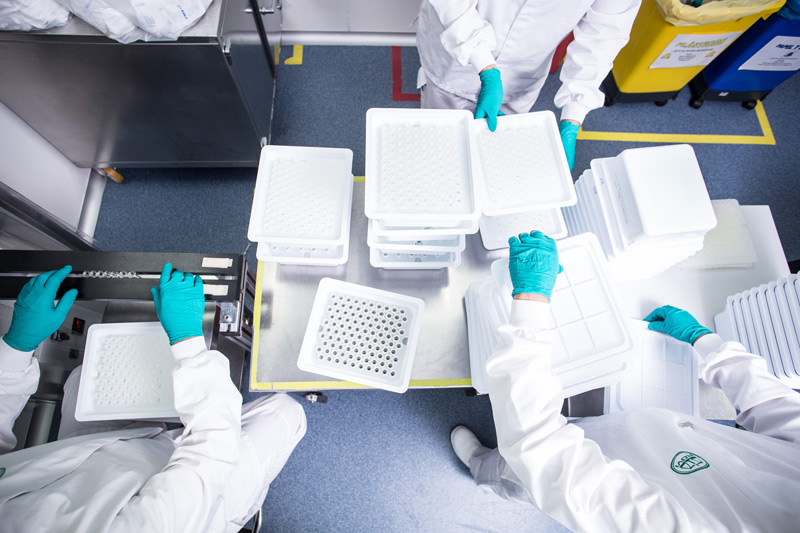The results of the phase III pivotal clinical trial show that the once-monthly injectable antipsychotic Doria® furnishes a significant improvement in the symptomatology and severity of the illness in patients with acute exacerbation of schizophrenia
Fri, 27/11/2020 - 00:00
4 minThe results of the phase III pivotal clinical trial show that the once-monthly injectable antipsychotic Doria® furnishes a significant improvement in the symptomatology and severity of the illness in patients with acute exacerbation of schizophrenia











6S3A7253.jpg
Today, Laboratorios Farmacéuticos Rovi, S.A. (www.rovi.es) has announced the online publication of the results of the pivotal study PRISMA-3 on the efficacy and safety of Doria® in schizophrenic patients in the journal npj Schizophrenia.
Doria® (Risperidone ISM®) is a novel investigational antipsychotic for the treatment of schizophrenia with once-monthly injections which has been developed and patented by Laboratorios Farmacéuticos ROVI S.A. and which, as of the first injection, provides immediate and sustained plasmatic drug levels and does not require loading doses or supplementation with oral risperidone.
The results obtained in this study show that both doses (75 mg and 100 mg once a month) have achieved the prespecified primary and secondary efficacy endpoints for treatment of patients with acute exacerbation of schizophrenia. The primary efficacy endpoint, the PANSS total score (mean difference, CI: 95%), improved significantly with Risperidone ISM® 75 mg and 100 mg from the beginning until day 85, with adjusted differences of -13.0 (17.3 to -8-8; p <0.0001) and -13.3 (-17.6 to -8.9; p<0.0001), respectively, in comparison with the placebo. Significantly improved mean changes for the secondary endpoint, the CGI-S score, were also obtained for Risperidone ISM® in comparison with the placebo, -0.7 (-1.0 to -0.5; p<0.0001), for both doses. The significant statistical improvement for both efficacy results was observed as early as 8 days after the first injection. The most frequently reported treatment-emergent adverse events were increased blood prolactin (7.8%), headaches (7.3%), hyperprolactinemia (5%) and weight increase (4.8%). No important new or unexpected safety information was reported.
According to the authors of the article, Risperidone ISM® represents an effective therapeutic strategy in schizophrenic patients who are admitted to hospital with an acute episode with severe or moderate psychotic symptoms.
Dr. Ibón Gutierro, ROVI’s Corporate R&D Manager, commented, “we are very pleased with these results since, not only do they prove that our ISM® technology works, but also because we believe that Doria® will be able to help cover an unmet medical need”.
“this study is proof that a schizophrenic patient with moderate to severe psychotic symptoms can also be treated successfully with a long-acting injectable antipsychotic like Doria®”, explained Dr. Gutierro.
On the basis of these positive results and the other data from the product, ROVI had previously announced the commencement (in January 2020) of the centralised procedure for registration with the European Medicines Agency (EMA). Likewise, at its Capital Markets Day held on 24 November, 2020, ROVI announced the filing of an NDA (New Drug Application), i.e. a registration dossier to obtain marketing authorisation in the USA, with the FDA (Food and Drug Administration).
About the PRISMA-3 study
The pivotal study PRISMA-3 is a multicenter, randomized, double-blind, placebo-controlled clinical trial to evaluate, after a period of 12 weeks, the efficacy and safety of once-monthly intramuscular injections of Risperidone ISM® in patients with acute exacerbation of schizophrenia.
A total of 438 patients were included in the double-blind period of the study and were randomly allocated (1:1:1) to receive Doria® ISM® 75 mg or 100 mg or placebo. 390 patients were included in the overall population analysed to verify efficacy. At the beginning of the study, the patients had been diagnosed with schizophrenia according to the criteria of the Diagnostic and Statistical Manual of Mental Disorders, 5th [AL2] Edition (DSM-V) and presented an acute exacerbation or relapse of the disease, confirmed by a PANSS total score between 80 and 120 and a CGI-S score greater than or equal to 4 (at least “moderately ill”). The prespecified primary efficacy endpoint in the study was the mean change at 12 weeks from baseline value in the PANSS total score, using a Mixed Effects Model with Repeated Measurements (MMRM), with the Hommel’s closed-testing correction procedure for multiple tests. In addition, the study protocol prespecified as a key secondary efficacy endpoint the mean change in the CGI-S total score at 12 weeks compared to the baseline value.
Patients who successfully completed the double-blind period were offered to continue in a long-term, open-label 12-month extension phase with once-monthly injections of Risperidone ISM® (75 mg or 100 mg). New, clinically stable patients ("de novo" patients) have also been able to enter this open phase of the study. The objective of the study extension phase is to check the safety, tolerability and durability of the long- term Risperidone ISM® effect.
About schizophrenia
Schizophrenia is a chronic, serious, and disabling mental disorder that affects about 1% of the global population. Schizophrenia patients are characterized by a mixture of psychiatric symptoms, both positive (delusional ideas, hallucinations, disorganized language and behaviour) as negative (affective flattening, speech poverty, abulia) in nature. The disease usually starts at a critical age for personal development, forcing patients in many cases to leave their educational or work activity, resulting in a great deal of suffering for the subjects and their family environment as well as representing an important loss for society at large. It is estimated that approximately 3% to 5% of total global health expenditure is devoted to schizophrenia.
About ISM® technology
ISM® is a technology platform for the release of drugs patented by ROVI, which is based on the in situ formation of biodegradable matrices after the administration of a liquid carrier. Its unique characteristics allow therapeutic levels of the medicine to be obtained quickly after its administration, without the need to for oral coadministration or additional booster or loading injections to achieve and maintain the levels in a predictable and sustained manner, which has a greater likelihood of satisfying the patient's clinical needs.